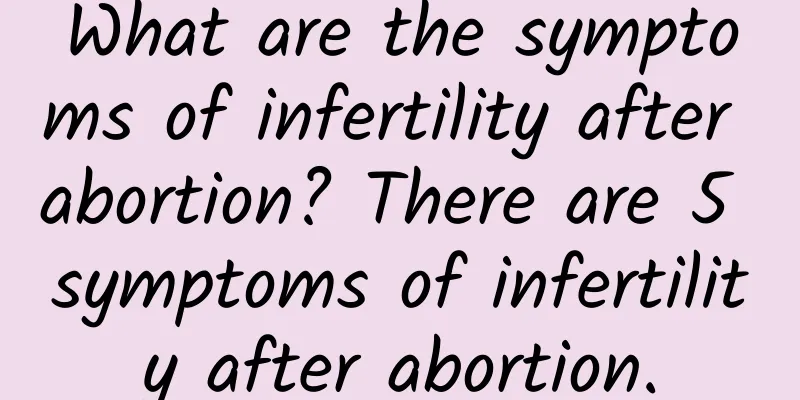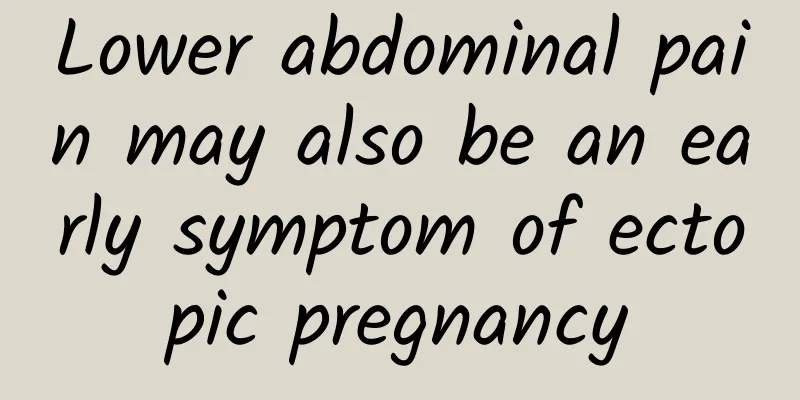What are the symptoms of infertility after abortion? There are 5 symptoms of infertility after abortion.

|
Abortion is very harmful to the body, especially it affects the health of the uterus. In fact, many female friends who have had abortions cannot successfully get pregnant and have children, which is a big blow to them. Therefore, it is necessary to detect this phenomenon in time so that you can rush to the hospital for examination, diagnosis and treatment as soon as possible, and you can't delay the time. So what are the symptoms of infertility after abortion? 1. Menstrual changes: including menstrual cycle changes, amenorrhea, dysmenorrhea and other symptoms. Menstrual cycle changes refer to early or delayed menstruation, excessive or insufficient menstrual flow, and prolonged menstruation. Experts from the Chinese Abortion Network said that menstrual cycle changes are common in patients with corpus luteum insufficiency and endometrial inflammation, and amenorrhea causes a large proportion of infertility. Dysmenorrhea is mainly caused by diseases such as endometriosis, pelvic inflammatory disease, uterine fibroids, uterine dysplasia, and abnormal uterine position. 2. Fever or edema during menstruation: A small number of women experience a series of symptoms periodically before and after menstruation, including "fever during menstruation", "edema during menstruation", "breast swelling before menstruation", "headache during menstruation", "diarrhea and oral erosion during menstruation", "facial acne before menstruation", "depression or irritability during menstruation", etc. These symptoms are often caused by endocrine disorders and luteal dysfunction, which can often lead to infertility. 3. Abnormal leucorrhea: When there is vaginitis, cervical erosion, endometritis, adnexitis, pelvic inflammatory disease and various sexually transmitted diseases, the leucorrhea will increase, be yellow in color, have an odor, be tofu-like or watery, or be accompanied by vulvar itching and pain, etc., and these diseases can affect conception to varying degrees. 4. Galactorrhea: Milk leaks out of the breasts spontaneously or after squeezing during the non-lactating period. This often indicates hypothalamic insufficiency, pituitary tumors, prolactinomas, primary hypothyroidism, chronic renal failure, etc. It can also be caused by contraceptives and antihypertensive drugs such as reserpines. Galactorrhea is often combined with amenorrhea and leads to infertility. 5. Abdominal pain: Chronic lower abdominal pain, bilateral abdominal pain or lumbosacral pain often occurs when there is pelvic inflammatory disease, myometritis, oophoritis, endometriosis, uterus, ovaries, or tumors. |
<<: What are the TCM syndrome differentiation and treatment methods for female cervicitis?
Recommend
What are the common symptoms of chronic adnexitis?
Since adnexitis is divided into acute and chronic...
Lose weight quickly by fasting but gain weight again? Study: Fluctuating weight may increase risk of high blood pressure
Have you ever used drastic fasting methods to los...
Will cervical warts last long?
Are cervical warts fatal? Many people would say t...
How to prevent vaginitis in daily life?
How should we prevent vaginitis in our daily life...
What foods should patients with third-degree cervical erosion not eat? 6 dietary taboos for third-degree cervical erosion
In life, "Diseases come from the mouth, disa...
What are the treatments for female cervical erosion? How long does it take for female cervical erosion to be cured?
What are the treatments for cervical erosion? Cer...
What are the diagnostic criteria for chronic pelvic inflammatory disease?
As we all know, women are a group that is prone t...
Will dysmenorrhea lead to infertility? Doctors tell the truth about dysmenorrhea and infertility
Primary dysmenorrhea will not lead to infertility...
How to diagnose symptoms of cervicitis
Usually we can divide cervicitis into acute cervi...
How to completely cure uterine effusion
Uterine effusion is mostly caused by uterine effu...
What are the early symptoms of ectopic pregnancy?
What are the early symptoms of ectopic pregnancy?...
Eat too much for dinner, be careful not to expand your waistline! Professor Liu Zhenfang: Watch out for these three dinner landmine combinations
The busier you are at work, the more you want to ...
What are the drugs for preventing miscarriage in early pregnancy?
What are the medicines for preventing miscarriage...
Clinical manifestations of pelvic inflammatory disease
Among gynecological diseases, pelvic inflammatory...
Can sanitary napkins identify uterine fibroids?
Most female friends who suffer from uterine disea...









